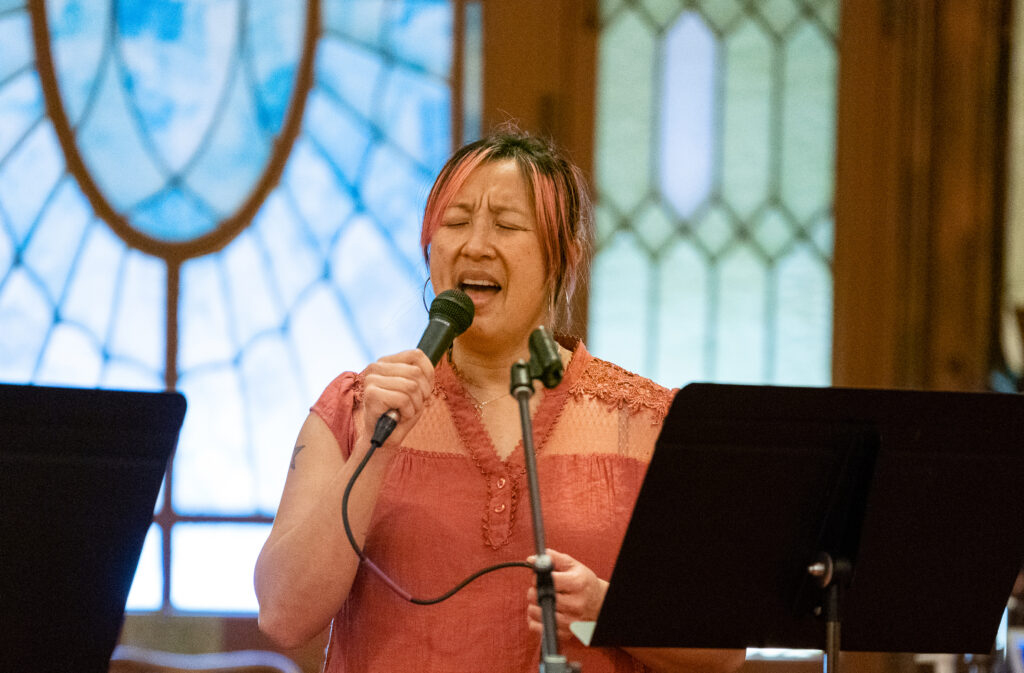“I don’t sing because I’m happy. I’m happy because I sing.” ― William James
There are few joys as accessible as singing—whether it’s singing along to the radio, joining a community choir, singing a bedtime lullaby to a child, or just in the privacy of your own shower—it’s the only instrument that’s part of yourself. Songs are endless avenues for storytelling, self-expression, connecting with cultural traditions, and unifying groups across many different styles and backgrounds. But it can be hard to know where to start if you want to pursue becoming a better singer. Should you start with voice lessons or join a choir? Maybe you’ve been discouraged in the past or don’t know what music fits your voice best. That’s where some guidance from an experienced teacher becomes invaluable! We talked with the CMC Voice Department to help answer some of the most common questions about where to start on your singing journey, and how working with a professional can help set you on the right path to expanding your range, building good technique to use your voice in a healthy way, and finding musical opportunities that bring you fulfillment.
Learn how your individual voice works.
Many beginners get caught up on defining their vocal range or style before they’ve fully explored it and forget that your voice can change with time, practice, age, and even medications you might be taking. Start simply by examining the quality of your speaking voice, and focus more on how your voice feels rather than how it sounds. Beginners often start with a limited range but don’t realize how much it can expand. An experienced voice teacher can explain how the anatomy of your vocal cords works, and offer ways to use breath support, resonance, and exercises to help build your voice with proper technique to avoid injury.
Should I take singing lessons or join a choir?
There’s no one-size-fits all answer, it can really depend on your experience, comfort level, style of music you’re interested in, and your musical goals. Lessons will offer personalized attention no matter what your experience is, and can help you define and achieve your personal goals, whether to learn the basics, prepare for an audition, or even to have better projection and stage presence in public speaking. Many ensembles, such as choirs, require a little more singing experience to navigate the harmonies, read sheet music, or follow a conductor, but there are also many community groups open to all to experience the camaraderie of singing with others. Think about what your goals and interests are and what groups are available. Remember that with healthy technique you can cross boundaries into any genre, so having a strong foundation allows you to explore new styles and interests.
Check out the Choral Summit to hear some of CMC’s choirs.
How often should I practice? What are the best voice exercises?
Many teachers recommend 3 times per week in addition to a lesson or ensemble rehearsal, but the most important thing is consistency: you’ll get out what you put in. Exercises like scales and arpeggios, and productive sounds like “sirens” can be effective for building tone, flexibility, and intonation, and a good teacher or director can suggest more tailored to you. It’s important to remember that stamina is built over time, don’t tire your instrument by practicing for too long at a time. There are also other ways to work on your repertoire, such as memorizing the words, translating texts, and listening to other singers!
Most importantly, have fun!
Having a sense of musical curiosity and playfulness is essential for creativity. Studies have shown that music is proven to lower stress, and the connections we make with one another through music can last a lifetime. It’s easy to get consumed with wanting things to be perfect, but that often causes us to forget why we started our musical studies in the first place. Practice makes progress, and as long as you’re enjoying it, that’s what matters.
Take the Next Step
Ready to take the next step in your musical journey? Sing with us at CMC! We’ve got talented and supportive faculty to help you find your creative voice, and a wide variety of vocal ensembles and choirs for all ages and levels of experience, in many different styles. Many of our choirs are tuition-free, like our Children’s Chorus and the Neighborhood Choir Program for Older Adults and Adults with Disabilities!



